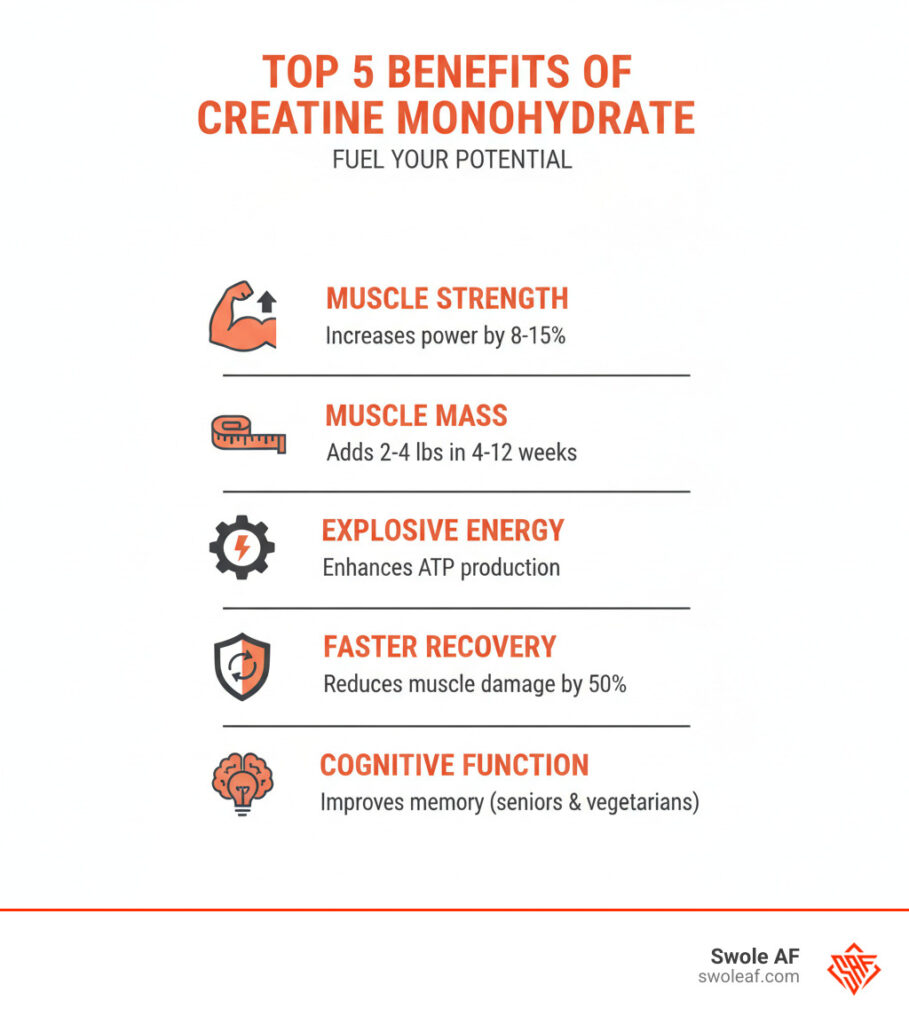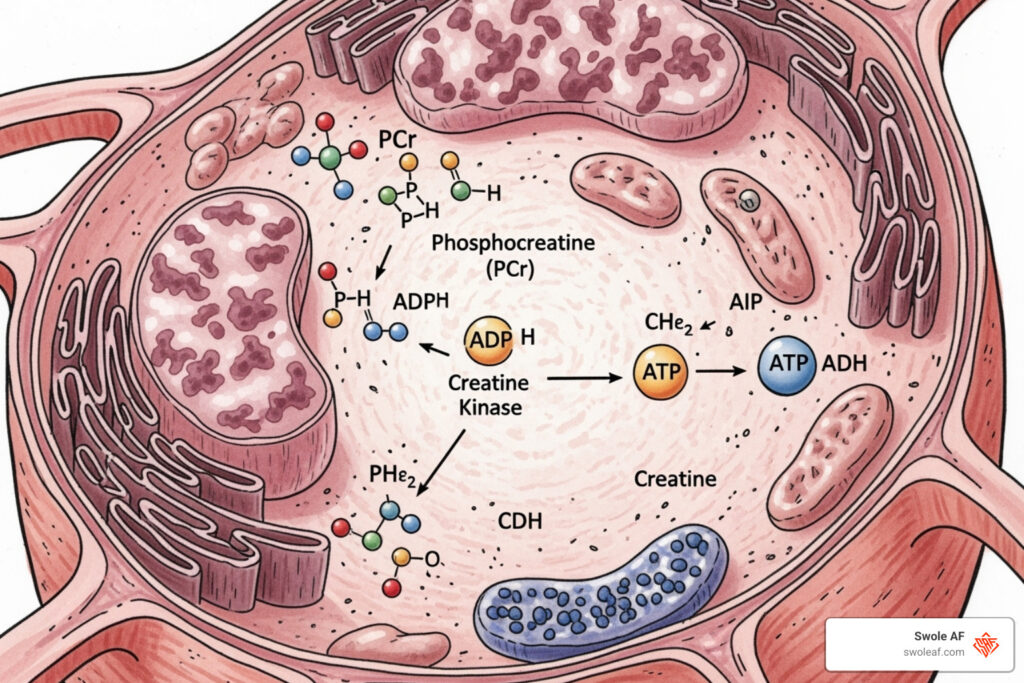Why Creatine Monohydrate Is One of the Most Powerful Supplements You Can Take
The benefits of creatine monohydrate are backed by decades of scientific research, making it one of the most studied and trusted supplements for improving physical and mental performance.
Quick Answer: Top Benefits of Creatine Monohydrate
- Increases muscle strength by approximately 8% compared to training alone
- Boosts muscle mass by 2-4 pounds over 4-12 weeks of training
- Improves high-intensity performance by up to 15%
- Speeds muscle recovery and reduces fatigue
- Improves cognitive function, especially in older adults and vegetarians
- Supports brain health and may help with neurological conditions
- Safe for long-term use, with no adverse effects shown in trials up to 5 years
Creatine works by increasing your muscles’ phosphocreatine stores, which helps produce more ATP—the primary energy currency your cells use during intense exercise. This means more power, more reps, and faster recovery.
Research shows creatine supplementation can increase these stores by 20-40%, leading to significant improvements in strength and power. But the benefits extend beyond muscle, with studies finding that creatine may also improve memory, reduce fatigue, and even support recovery from traumatic brain injuries. It’s particularly beneficial for vegetarians and older adults who have lower natural creatine levels.
As a wellness journalist with over 15 years of experience researching evidence-based supplements, I’ve seen how understanding the benefits of creatine monohydrate can transform training results. In this guide, we’ll break down how creatine works, its benefits, and how to use it safely.

What is Creatine and How Does It Fuel Your Body?
Creatine is a natural substance that gives your muscles a burst of power during intense workouts. It’s a compound made from three amino acids—arginine, glycine, and methionine—produced daily by your liver, kidneys, and pancreas. While your body makes about 1 gram per day, this is often not enough for an active lifestyle.
About 95% of your body’s creatine is stored in your skeletal muscles as phosphocreatine (PCr). This storage is key to understanding the benefits of creatine monohydrate supplementation.
During explosive movements, your muscles use ATP (adenosine triphosphate) for energy, but these stores only last for about 10 seconds of maximum effort.

When ATP is used, it is converted to ADP (adenosine diphosphate). To continue performing at high intensity, your body must quickly convert ADP back into ATP. This is where phosphocreatine helps. It donates its phosphate group to ADP, rapidly regenerating fresh ATP through a process called ATP resynthesis.
The faster you can resynthesize ATP, the longer you can maintain maximum intensity. Supplementing with creatine monohydrate can increase your intramuscular phosphocreatine stores by 20-40%, giving you a much larger pool of quick energy for muscle contraction.
This makes creatine the ultimate high-intensity fuel source. While you can get some creatine from red meat and seafood, you’d need to eat impractical amounts to match the dose from a single scoop of creatine monohydrate. Supplementation is a far more efficient way to maximize performance.
The Top Athletic Performance & Health Benefits of Creatine Monohydrate
Now that we understand how creatine works, let’s explore its real-world impact on training, recovery, and overall health. The benefits of creatine monohydrate go far beyond just lifting heavier weights.
How Creatine Impacts Muscle Growth and Strength
Creatine monohydrate promotes real, lasting muscle growth. Research consistently shows that users experience significant increases in muscle mass, with some studies finding gains of 2-4 pounds over 4-12 weeks when combined with regular training. Initially, some of this is water weight from cell volumization, a process where water is drawn into muscle cells. This cellular hydration signals the body to build more muscle and contributes to a fuller, more muscular appearance.
Creatine also works at a deeper level by altering cellular pathways that boost the formation of new muscle proteins. It raises levels of IGF-1, a powerful growth hormone, and decreases levels of myostatin, a molecule that inhibits muscle growth. By reducing myostatin, creatine allows you to build muscle more efficiently.
The strength gains are equally impressive. Studies show creatine supplementation can increase maximal strength by approximately 8% and muscle endurance by 14% compared to training alone. This means more weight, more reps, and superior training adaptations over time. The International Society of Sports Nutrition has even called creatine the world’s most effective supplement for adding muscle mass. To learn more, explore our Muscle Building Nutrition Plan and Guide to the Best Supplements for Muscle Growth.
The High-Intensity Performance Benefits of Creatine Monohydrate
For training that involves explosive movements or sprints, the benefits of creatineonohydrate are transformative. By fueling the ATP-PC energy system, it provides more “quick burst” energy. A comprehensive review found that creatine can improve high-intensity exercise performance by up to 15%. This translates to increased strength, better sprint ability, greater muscle endurance, more ballistic power, and higher fatigue resistance.
These benefits allow you to perform more work during each training session, which over time leads to greater gains in strength, muscle, and overall performance. It’s invaluable for weightlifting, powerlifting, sprinting, and sports like football or basketball, all without negatively impacting aerobic endurance. For more on this, check out our guides on Weight Lifting Supplements and Best Workout Supplements for Men.
How Creatine Speeds Up Muscle Recovery and Reduces Fatigue
The benefits of creatine monohydrate also extend into the recovery phase. Creatine helps reduce muscle damage and soreness after intense training by lowering post-exercise inflammatory responses. It speeds up the replenishment of phosphocreatine stores during rest, meaning you’re ready to go hard again sooner.
Beyond muscle recovery, creatine can combat general tiredness. Studies have found that it can reduce fatigue and increase energy levels, even with poor sleep. In a 6-month study on individuals with traumatic brain injury, creatine supplementation led to a 50% reduction in dizziness and significantly decreased fatigue. It may also reduce the frequency of dehydration and muscle cramping by increasing water content within your muscle cells, making muscle tissue more resilient and helping you bounce back faster from intense training. To optimize your recovery, read our articles on What Supplements Help Repair Muscles and Post-Exercise Recovery Supplements.
Beyond the Biceps: Surprising Brain and Health Benefits
While creatine is famous for its physical benefits, some of its most exciting advantages are for your brain, nervous system, and metabolic health. The benefits of creatine monohydrate extend far beyond the gym.
Opening up the Cognitive Benefits of Creatine Monohydrate
Your brain is an energy-intensive organ that requires a constant supply of ATP. By increasing phosphocreatine stores in the brain, creatine supplementation improves ATP production, leading to better mental performance. It also appears to boost dopamine levels and support mitochondrial function, which are critical for brain health.
The cognitive benefits of creatine monohydrate are especially pronounced in certain groups. Vegetarians, who have lower baseline levels, can see 20-50% improvements in memory and intelligence test scores after supplementation, as highlighted in scientific research. Older adults show significant improvements in memory and recall after just two weeks of use. Creatine may also help with reasoning skills and offer neuroprotection against age-related decline.
Furthermore, studies show that creatine improves working memory and processing speed in sleep-deprived individuals. It has also shown promise in reducing symptoms of depression when combined with therapy and in alleviating brain fog for those with Long Covid. We explore these topics in our Complete Guide to Creatine & Brain Health.
Potential Role in Neurological Health and Blood Sugar
Many neurological diseases are linked to reduced phosphocreatine levels in the brain. While human studies on Parkinson’s disease have shown mixed results, combining creatine with weight training did improve strength and daily function. Animal models for Huntington’s disease and ALS have shown more encouraging outcomes, including restored brain energy stores, reduced cell death, and improved motor function. Early research also suggests potential benefits for Alzheimer’s, stroke, and epilepsy, though more human trials are needed.
For metabolic health, creatine can improve blood sugar management. It improves the function of GLUT-4, a transporter that moves sugar from the bloodstream into muscles. A 12-week study showed that combining creatine with exercise led to better blood sugar control after a high-carb meal compared to exercise alone, as detailed in this research. These diverse applications show that creatine is a supplement with broad health implications.
Your Guide to Safe and Effective Creatine Supplementation
Understanding how to use creatine properly is key to maximizing its benefits. The science provides clear, evidence-based guidance for safe and effective supplementation.

Recommended Dosages and Supplementation Strategies
You have two effective dosing strategies. The first is a loading phase: take 20 grams of creatine per day for 5-7 days, split into four 5-gram doses, to rapidly saturate your muscles. After loading, switch to a maintenance phase of 3-5 grams daily to keep your stores topped off.
Alternatively, you can skip loading and take the 3-5 gram maintenance dose from the start; full saturation will just take about 3-4 weeks. Consistency is more important than timing, but some research suggests a slight edge to taking creatine post-workout. Combining creatine with carbohydrates or protein can improve muscle absorption. Despite common myths, there is no scientific need to cycle off creatine; continuous use is proven safe and effective.
For more guidance, see our articles on Supplement Dose: How to Determine How Much You Need and Supplement Stack for Fitness Goals.
Is Creatine Safe and Are There Side Effects?
Creatine monohydrate is one of the most studied supplements and has an exceptional safety profile. Clinical trials lasting up to 5 years show no adverse effects in healthy individuals. The persistent myth that creatine causes kidney damage is unfounded in people with healthy kidneys.
The most common side effect is water weight gain (2-4 pounds) in the first week, as creatine draws water into muscle cells. This cell volumization is part of how creatine works and contributes to a more muscular look. Some people may experience mild digestive upset during a loading phase, which can be mitigated by splitting the dose. As for caffeine, most studies show no negative interaction, and many athletes safely combine creatine with coffee or pre-workout.
However, always consult a healthcare provider before starting any supplement if you are pregnant, breastfeeding, or have pre-existing health conditions like kidney or liver disease. At Swole AF, we manufacture our Creatine Mono in the USA to ensure quality and purity.
Who Benefits Most from Creatine Monohydrate?
The benefits of creatine monohydrate apply to a diverse range of people.
- Athletes and bodybuilders benefit from increased strength, power, and muscle growth.
- Vegetarians and vegans often see dramatic improvements in physical and cognitive performance due to lower baseline creatine levels.
- Older adults can use creatine to help preserve muscle mass, maintain strength, and support cognitive function.
There is also emerging research on its benefits for certain neurological conditions and for individuals dealing with sleep deprivation or brain fog. Creatine monohydrate is the gold standard form—it is the most researched, effective, and affordable option available, and it’s the form used in the vast majority of successful studies. Learn more in our guide on Best Practices to Follow When Choosing a Muscle Building Supplement.
Frequently Asked Questions about Creatine Monohydrate
Let’s address some of the most common questions about creatine supplementation.
Will creatine make me gain weight?
Yes, but it’s the kind of weight you want. Initially, you’ll gain 2-4 pounds of water weight as creatine pulls water into your muscle cells (cell volumization), making them look fuller. This is not fat. Over the long term, creatine helps you gain actual lean muscle mass when combined with resistance training. So, the number on the scale goes up because you’re building muscle.
Do I need to cycle off creatine?
No, you do not need to cycle off creatine. Extensive research, including studies lasting up to five years, has confirmed that continuous daily use is safe for healthy individuals. Your body’s natural production is not harmed. If you stop taking it, your muscle stores will simply return to their baseline levels over several weeks. For consistent benefits, continuous use is recommended, as it keeps your muscle saturation levels optimal.
Can I mix creatine with my pre-workout or coffee?
Yes, for most people, mixing creatine with your pre-workout or coffee is perfectly fine and convenient. While some older, mixed research created confusion, the current consensus is that moderate caffeine intake does not negate creatine’s benefits. Many people combine them daily without issue. Pay attention to your own tolerance, but it’s generally considered safe and effective to combine them for the full benefits of creatine monohydrate.
Conclusion
Creatine monohydrate is one of the most researched and effective supplements available. It’s scientifically proven to help you build 2-4 pounds more muscle mass, increase strength by approximately 8%, and boost high-intensity performance by up to 15%. We’ve explored the deep benefits of creatine monohydrate, from fueling athletic performance to speeding up recovery.
Beyond the gym, creatine improves cognitive function—especially for vegetarians and older adults—and shows promise for supporting neurological health and blood sugar management. Backed by studies confirming its long-term safety, creatine is a reliable tool for both physical and mental performance.
At Swole AF, we’re passionate about providing supplements that work. Our creatine monohydrate is manufactured in the USA, ensuring the purity and quality you need to achieve your goals. We stand behind our products with the confidence that comes from solid science.
Ready to open up your potential and experience these science-backed benefits for yourself?
Experience the benefits with our USA-made Creatine Monohydrate



